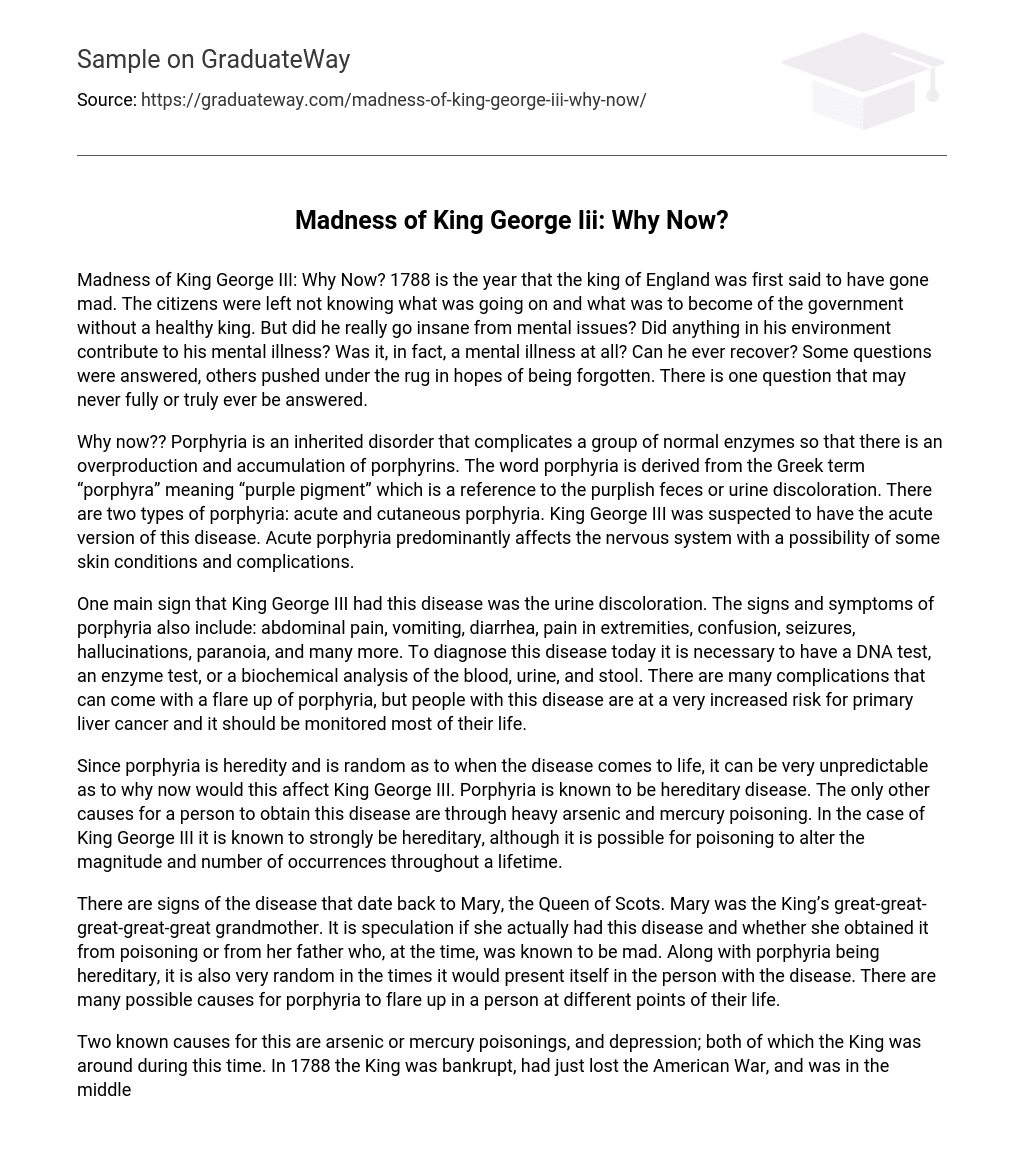Madness of King George III: Why Now? 1788 is the year that the king of England was first said to have gone mad. The citizens were left not knowing what was going on and what was to become of the government without a healthy king. But did he really go insane from mental issues? Did anything in his environment contribute to his mental illness? Was it, in fact, a mental illness at all? Can he ever recover? Some questions were answered, others pushed under the rug in hopes of being forgotten. There is one question that may never fully or truly ever be answered.
Why now?? Porphyria is an inherited disorder that complicates a group of normal enzymes so that there is an overproduction and accumulation of porphyrins. The word porphyria is derived from the Greek term “porphyra” meaning “purple pigment” which is a reference to the purplish feces or urine discoloration. There are two types of porphyria: acute and cutaneous porphyria. King George III was suspected to have the acute version of this disease. Acute porphyria predominantly affects the nervous system with a possibility of some skin conditions and complications.
One main sign that King George III had this disease was the urine discoloration. The signs and symptoms of porphyria also include: abdominal pain, vomiting, diarrhea, pain in extremities, confusion, seizures, hallucinations, paranoia, and many more. To diagnose this disease today it is necessary to have a DNA test, an enzyme test, or a biochemical analysis of the blood, urine, and stool. There are many complications that can come with a flare up of porphyria, but people with this disease are at a very increased risk for primary liver cancer and it should be monitored most of their life.
Since porphyria is heredity and is random as to when the disease comes to life, it can be very unpredictable as to why now would this affect King George III. Porphyria is known to be hereditary disease. The only other causes for a person to obtain this disease are through heavy arsenic and mercury poisoning. In the case of King George III it is known to strongly be hereditary, although it is possible for poisoning to alter the magnitude and number of occurrences throughout a lifetime.
There are signs of the disease that date back to Mary, the Queen of Scots. Mary was the King’s great-great-great-great-great grandmother. It is speculation if she actually had this disease and whether she obtained it from poisoning or from her father who, at the time, was known to be mad. Along with porphyria being hereditary, it is also very random in the times it would present itself in the person with the disease. There are many possible causes for porphyria to flare up in a person at different points of their life.
Two known causes for this are arsenic or mercury poisonings, and depression; both of which the King was around during this time. In 1788 the King was bankrupt, had just lost the American War, and was in the middle of a constitutional struggle. The American War started in 1775 and by 1779, France and Spain had given their loyalty to the new America and against England. The King has been accused of trying to keep the country in the war in hopes of getting back the power that was once his.
He did all of these things despite the opinions of his advisors and ministers. Therefore he went through multiple ministers during this time. Needless to say, he was depressed and paranoid that a coo was constantly about behind his back. King George III also, during the time, was taking and using medications and skin conditioner that had arsenic and mercury in the substances. There was very little knowledge of medications and diagnosis in this time of history, so none of the doctors could tell what they were actually doing to the King.
In 1855 was the first time that there was a suggestion that there was an actual diagnosis of a medical problem with King George III. At this time he was said to have acute mania, which was diagnosed differently in 1941 as manic depression psychosis. It wasn’t until 1966 that the diagnosis was known to be a physical illness that caused the madness, porphyria. Porphyria is what leads the King to lose his power. In 1810, after his last known drastic flare up of the disease, his son, George the Price of Whales, was named Price Regent and overtook his fathers power for his “wellbeing”.
Although it wasn’t until January of 1820 when he died, he never truly regained his power or his full mind for that matter. In late 1811 he became permanently insane and was sent away to Windsor Castle where he spent the rest of his life. It was said that he never truly became sane after 1810, but there is also speculation if he ever truly was better after any of his times of madness. Most of the country wanted nothing more than to see the King well again and come to power, as it happened other times.
He never could regain his sanity and so the country was full of even more questions as to what was going to happen to the government with the knew Prince Regent, and how would this change the way of life citizens had been so used to for the past 59 years under the reign of King George III. Finally, the question that was asked that has still yet to be answered. Why now?
Sources used… Biography of King George- http://www. spartacus. schoolnet. co. uk/PRgeorgeIII. htm http://www. nndb. com/people/948/000068744/ Porphyria- http://www. ncbi. nlm. nih. gov/pubmedhealth/PMH0002188/ http://www. mhhe. com/biosci/ap/saladin/cardio/reading20. mhtml





